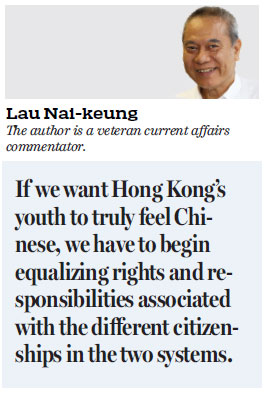Bringing Hong Kong youth on board calls for more equal treatment
Updated: 2017-05-24 07:12
By Lau Nai-keung(HK Edition)
|
|||||||||
Central government authorities last month released the country's first 10-year youth development plan, vowing it will offer better policies, education and healthcare services for the age group.
This is the first time central government authorities have released a development plan specifically for the youth on the mainland. This important milestone, however, has attracted little attention in Hong Kong.
In the Middle- and Long-term Youth Development Plan (2016-25), published by the Communist Party of China Central Committee and the State Council, youth is defined as people from 14 to 35 years old.
The plan covers 10 categories: ideological cultivation, education, healthcare, marriage, employment, culture, social integration and participation, protection of legal rights, crime prevention and social security. It aims to create a comprehensive system of youth development policies and procedures by 2020, followed by an improved version by 2025.

The plan states it will elevate the political, professional and personal qualities of China's youth, shaping them into the driving force of the Two Centenary Goals - building a moderately prosperous society by 2021 and a strong, democratic, civilized, harmonious and modern socialist China by 2049.
"Youth policy" has been an empty slogan in Hong Kong's policy circles. As Hong Kong people do not believe in government-led initiatives, they can only conceive of market-based solutions to our youth's problems. The widespread value-neutral relativism makes any proposed goals vague and indefinable.
In contrast, the national youth development plan can be very specific. To promote health and fitness, in addition to providing more access to mental and physical care, the plan encourages every young person to play at least one sport. To be exact, it prescribes soccer.
To foster a healthy and rational marriage view, the plan advocates including marriage education in the higher education curriculum. Marriage counseling and services for older, single young people will also be funded.
Hong Kong's policymakers can learn from the plan's impressive specificity and focus on results.
In fact, the development plan has dedicated two sessions to Hong Kong. Taken together, these sessions focus on exchanges between young people on the mainland and Hong Kong, Macao and Taiwan.
Supposedly, more exchanges are always a good thing. Unfortunately, the many exchanges in the past failed to deliver significant positive impact on the building of "national identity" among young people in these special regions. In particular, "independence" movements among the youth in Hong Kong and Taiwan have grown as more "exchanges" take place.
For example, Cheng Chung-tai received his PhD from Peking University but his intimate knowledge about the mainland has failed to make him support central government authorities. Instead, he became a prominent dissident and lawmaker soon after returning to Hong Kong. A similar case is Alvin Yeung Ngok-kiu, who obtained a master of laws in constitutional and administrative laws also from Peking University and is now leader of the Civic Party.
Clearly, instilling the right kind of values among the Hong Kong youth takes more than mere exposure to the mainland. National identity has a lot to do with citizenship. The problem with Hong Kong is that it has developed a citizenship different from that of the mainland. This has produced two sets of different and sometimes conflicting rights and responsibilities.
The mainland has ample opportunities in different business sectors. However, the business environment on the mainland is different from that of Hong Kong in aspects such as trading and foreign investment laws, import-export control and taxation. In addition, in the course of economic liberalization, the mainland has been revising its foreign economic and trade regulations. Under such circumstances, many Hong Kong companies intending to start business in the mainland are left at a loss.
The Middle and Long-term Youth Development Plan would like to encourage young Hong Kong people to work or start businesses on the mainland. For this to be effective, we first have to teach our young people about doing business on the mainland - its consumers, regulations, business practices, etc.
More fundamentally, we have to provide national treatment to Hong Kong people working on the mainland. Right now, Hong Kong people are treated like any other foreign employee. Companies created by Hong Kong people are considered foreign invested enterprises. They are not eligible for many government subsidies and are excluded from many of the more lucrative sectors.
If we want Hong Kong's youth to truly feel Chinese, we have to begin equalizing rights and responsibilities associated with the different citizenships in the two systems.
(HK Edition 05/24/2017 page8)